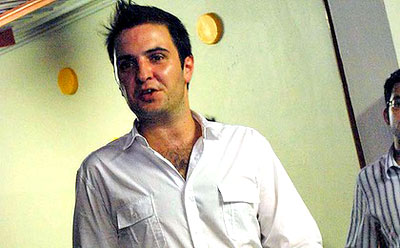|
from TheSundayMorningHerald Website
Facebook cookie collection 'could be dangerous'!
could abuse Facebook's practice - as claimed by a blogger -
of tracking online activity
even after users log out of the social network
An Australian technologist has caused a global
stir after discovering
Facebook tracks the websites its users visit even
when they are logged out of the social networking site.
But they have been
met with alarm by some who fear over-sharing.
Causing a stir... Australian Nik Cubrilovic first spotted the tracking issue.
Photo: Flickr.com/e27singapore Of course, Facebook's bottom line improves the more users decide to share.
Reports suggest that Facebook staff refer internally to "Zuck's law", which describes Facebook founder Mark Zuckerberg's belief that every year people share twice as much online - a trend that has caused Facebook's valuation to skyrocket towards $US100 billion.
But in alarming new revelations, Wollongong-based
Nik Cubrilovic
conducted
tests, which revealed that when you log out of Facebook, rather than
deleting its tracking cookies, the site merely modifies them, maintaining
account information and other unique tokens that can be used to identify
you.
Facebook founder Mark Zuckerberg shows off the new Facebook profiles at the F8 conference last week.
Photo: AFP Whenever you visit a web page that contains a Facebook button or widget, your browser is still sending details of your movements back to Facebook, Cubrilovic says.
Facebook's new Timelines feature creates a chronological scrapbook of major events in your life.
Photo: AFP
Cubrilovic is working on a new unnamed start-up but has previously been
involved with large technology blog
TechCrunch and online storage company
Omnidrive.
In an email interview he accused the social networking site of attempting to ''normalize gross and unsafe overexposure''.
Stephen Collins, spokesman for the online users' lobby group Electronic Frontiers Australia, said he did not believe Cubrilovic's revelations would see people turn away from the site in droves but he hoped users became more engaged with the issue.
Collins said the only reason he still uses Facebook is to help his 14-year-old daughter on the site. He said it took him an hour to lock down his profile to his satisfaction following the recent changes.
Others have compared Facebook's changes to Bentham's panopticon - a design for a prison where the guards can see all inmates but where the inmates never know whether they're being watched.
The result, applied to Facebook, is that real-time sharing means we always feel like we're being watched and this then influences our behavior. Cubrilovic said he tried to contact Facebook to inform it of his discovery but did not get a reply.
He said there were significant risks to the privacy of users, particularly those using public terminals to access Facebook.
The Australian Privacy Commissioner, Timothy Pilgrim, would not comment specifically on Cubrilovic's findings but said generally social networking sites need to clearly spell out when browsing information is being collected, the purposes for which it may be used and whether it will be disclosed to other organizations.
The findings come after technology industry observer
Dave Winer
declared
Facebook was scaring him because the new interface for third-party
developers allows them to post items to your Facebook feed without your
intervention. This has been dubbed "frictionless sharing".
However, it appears Facebook has now disabled this function, describing it
to gadget
blog Gizmodo as a "bug".
...Even
After Logging Out
staff writer
The social media empire Facebook has unveiled some new "features" on its platform in recent days that many allege are a total and compete privacy-breaching nightmare.
But one hidden feature, discovered by Nik
Cubrilovic, an Australian entrepreneur and writer, that few people are
aware of is the fact that Facebook now monitors your online activity, even
when you are not logged in to the service.
And now, even after logging out of Facebook, permanent "cookies" track all your movements on websites that contain Facebook buttons or widgets.
But how many Facebook users will actually know to do this?
The site has never announced to its users that
it is even tracking them in the first place, let alone given them any
instructions on how to "opt-out" of this egregious invasion of privacy.
It has switched from an "opt-in" approach, where users used to be given the option to "upgrade" to new features, to a much more complicated "opt-out" approach, where Facebook makes drastic changes and leaves it up to users to somehow figure out how to change things back to the way they were (if such an option is even still possible).
|



